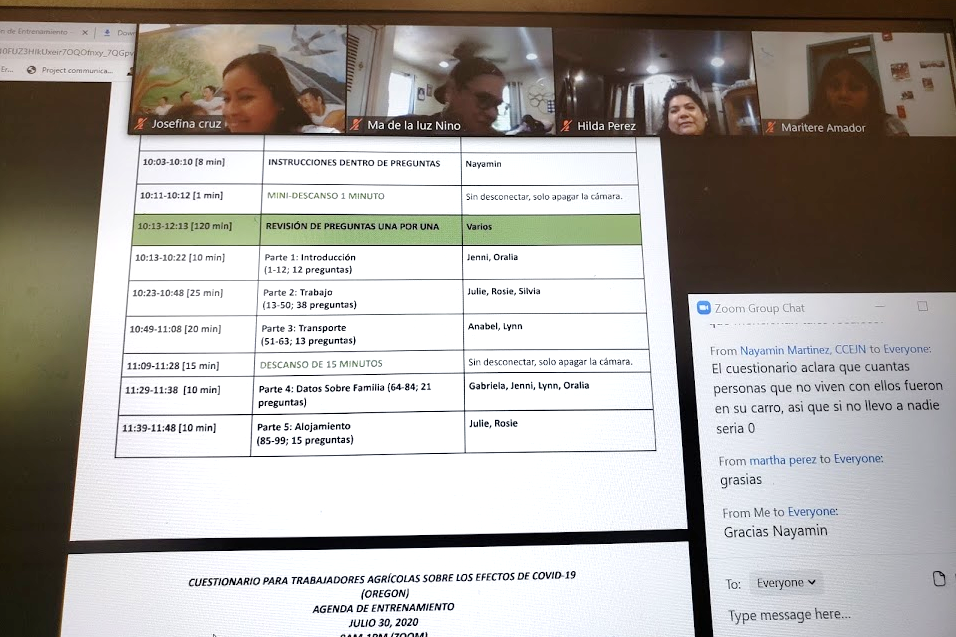FHDC Promotores have been incredibly involved in supporting our communities all year with COVID-19 response, online school adaptation, health and food resources and distribution, and more. One of the ways that they have participated at the State level is by joining the Farmworker Study Team to help give feedback and input from our farmworker communities. FHDC Promotores helped facilitate more than 20% of the statewide surveys. On Tuesday, September 22, the results of the Statewide Farmworker Survey will be announced at a press conference at 11:00 am PST.
Press Release from the Consortium:
Portland, Oregon — The Oregon COVID-19 Farmworker Study Team (a consortium of 11 farmworker-serving organizations and academics from Portland State University, University of Oregon, and Oregon State University) announces the preliminary survey findings from more than 200 farmworkers living across all of Oregon. The initial findings provide unique insights into the conditions of these essential workers during the pandemic that are now exacerbated by historic wildfires. Preliminary results from this unique study—the only statewide survey to gather data directly from farmworkers currently working through COVID—will be released at a virtual press conference on September 22nd, 2020 at 11 am PST. The results, also to be included in an accompanying research data brief, provide critical missing information on worksite conditions and farmworkers’ abilities to protect themselves while continuing to harvest the food that feeds Oregonians and consumers nationwide and globally.
The COVID-19 global pandemic exacerbated by unprecedented wildfires in Oregon has demonstrated that farmworkers deemed “essential” are on the climate crisis’s frontlines, worsening already hazardous working conditions to maintain food on our tables. Oregon’s farmworker population as a group, of which a significant subsection are Latinx and Indigenous to Mexico and Guatemala, have experienced disproportionately higher rates of COVID-19 infection than people from other ethnic backgrounds and work industries. Oregon Health Authority’s COVID-19 weekly report continues to highlight food packing and agricultural worksites as uniquely vulnerable to the spread of the virus due to workflows and other factors that create an overrepresentation of cases suffered by people of color in agricultural worksites— such as high infection rates in agriculture areas like Umatilla, Morrow, and Malheur Counties.
Despite challenges, our research finds Oregon farmworkers are demonstrating a serious commitment to safety in the face of COVID-19. Many are confronting economic, health, and social challenges without adequate safety nets and protections. The consequences signal a new normal, demanding immediate attention to maintain farmworkers’ safety and well-being at work and home. Initial findings include:
- When personal protective equipment and masks are available, farmworkers take necessary precautions and follow safety procedures at home and in the workplace to minimize exposure to COVID-19.
- Farmworkers report periods during the working day when they lack appropriate personal protective equipment (PPE) and cannot socially distance, despite saying that employers have taken some steps to prevent COVID-19 infection.
- Farmworkers experienced a significant loss of work and income during the COVID-19 pandemic creating broad economic challenges.
- Farmworkers know people infected or have been directly exposed to COVID-19, but few report getting tested. Cost and fear of losing a job are significant barriers to accessing testing and care. 5. Few farmworkers have the means to quarantine or isolate if they or someone in their household is sick.
- One-half or more of farmworkers surveyed remain unaware of paid sick leave benefits and existing relief funds organized by the federal government and State of Oregon.
- Farmworkers that speak Indigenous languages face additional information and accessibility gaps. Oregon Indigenous farmworkers speak at least 22 different languages from Guatemala and Mexico (such as Triqui, Mixtec, Mam, Kanjobal, among others) and many are not fluent or literate in Spanish.
- Farmworkers are also caregivers. Farmworkers have trouble accessing affordable childcare and supporting their children’s education with the shift to remote classes.
- Farmworkers are feeling increasing stress levels affecting their emotional well-being yet most lack access to mental health services.
- Farmworkers worry greatly about family members outside the U.S. and the pandemic has resulted in a significant reduction in remittances sent to families in Mexico and Guatemala who depend on them.
Registered participants will receive a press kit including the full Preliminary Data Brief and a Policy and Action Brief that will be shared with legislators at the upcoming special session of the Oregon state legislature. Those policy proposals can be found here.
The Oregon COFS Team will be represented by: Jennifer Martinez (Portland State University and Principal Investigator), Lynn Stephen (University of Oregon), Ron Mize (Oregon State University), CASA of Oregon, Bienestar, Centro Cultural de Washington, Farmworker Housing Development Corporation, Oregon Law Center, UNETE. Reyna Lopez (PCUN, Farmworkers and Latinx Working Families United), Ubaldo Hernandez (Comunidades), and a slate of scholars will be available for the question and answer discussion.
###
The Oregon COVID-19 Farmworker Survey is part of a three-state effort (Oregon, California, and Washington) coordinated by the California Institute for Rural Studies with participation from a wide group of farmworker organizations, researchers, and policy advocates. The study has been generously supported in Oregon by the Oregon Community Foundation, CASA of Oregon, and the University of Oregon. A full list of project partners and supporters is available at www.covid19farmworkerstudy.org.

